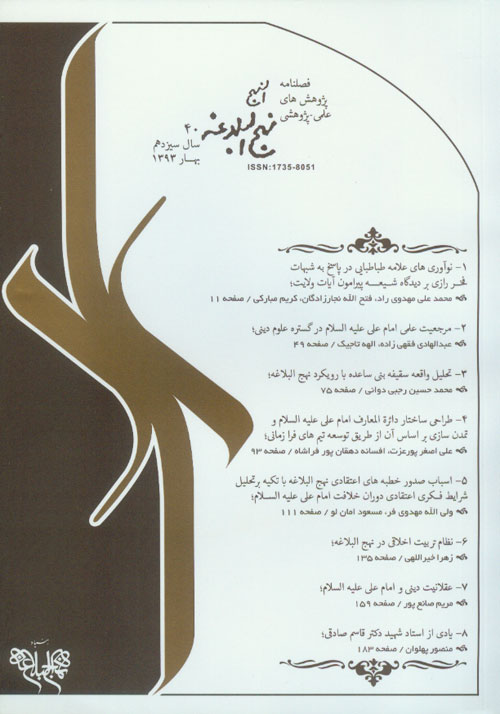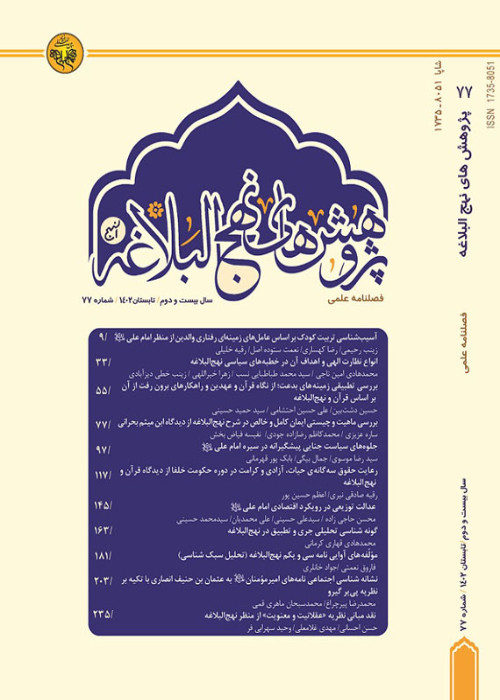فهرست مطالب

نشریه پژوهش های نهج البلاغه
سال سیزدهم شماره 1 (پیاپی 40، بهار 1393)
- 224 صفحه، بهای روی جلد: 70,000ريال
- تاریخ انتشار: 1393/02/16
- تعداد عناوین: 9
-
- سرمقاله
-
صفحه 5
-
صفحه 135
-
صفحه 159
-
صفحه 183
-
Page 11Verses 55 and 56, which in the view of Shiite Quranic scholars are known to “Velayat” verses, are those verses Islamic scholars have very different interpretation of them. These verses are the most important verses in the Quran about the “Velayat” and “Imamate” of “House hold of Holy Prophet” in the perspective of Tabatabai. Diverse views on these verses, on the part of sects, have arisen several historical, anecdotal, interpretative and theological discussions. The main line of this variation is due to the fundamental question of “Nass on Imamate” in Shiite thought and denial (or at least suspect) of it by Sunnis. The Shiite scholars regard that the verses of “Velayat” definitely denote to the imamate of Imam Ali (AS). Some of them regard these verses are the most strong and the most important reason or argument on this issue. Sunni scholars have suggested different and diverse interpretations about these verses and have accommodated them to several and different people. And it has caused some of them to seek to undermine the Shiite perspective on these verses. The most important conflict has been posed by Fakhr-e Razi in his Tafsir-e Kabir. This article presents the new perspectives of Tabatabai in response to questions posed by Fakhr.Keywords: Quran, Tabatabai, Fakhr –e Razi, verses of “Velayat”, Shiite scholars
-
Page 49Scientific Authority of Imam Ali (AS), including aspects of interpretation, the Qur’anic sciences, jurisprudence, theology and literary ideas and is proven and endorsed by numerous groups of scholars. According to Islamic scholars, Imam Ali as a narrator of the ahadith of the Prophet (pbuh) and as an eminent religious scientist, has played an important role in the establishment and transmission of Islamic Sciences; so that the writings of scientists from the works of Imam Ali (AS) and the use of numerous groups of scholars from them points his widespread scientific and rational position and the continuity of his scientific authority in the history of Muslims. That position is based on the following elements: his supremacy and authority to the Companions of holy Prophet in the various areas of scholarship, transmission of traditions in most of the Islamic sciences and establishment some rules in the various sciences, presenting fundamental solutions to solve scientific problems and playing an efficient role in the transmission of prophetic sciences.Keywords: Imam Ali, scientific authority, Islamic sciences, sects
-
Page 75Prophet Muhammad (pbuh) presented the greatest and most perfect divine teachings to guide humankind eternally; and to ensure the continuation of his way pronounced Ali (AS)’s “Velayat” according to Allah’s command,” at Ghadir Khom. But the companions of the Prophet of Islam brought about an important deviations in the Muslim world that its consequences suffered theem until today. Such deviation rose from Saqyfa of Bani Saedeh and Ali (AS) knew his duty to stand against the deviation that was threatening the religion and world of Muslim nation. In this paper, first, the reason of the rejection of the Imam Ali’s “Velayat” on the part of Mohajerin and Ansar, resulting from tribal rivalries and the lack of understanding and knowledge of the “Velayat”, has been discussed, then the formation of the discussions and arguments that led Saqyfa the caliphate of Abu Bakr ibn Abi Qahafa has been explained. The positions Ali (AS) and his powerful logic to invalidate the logic of the usurpers of the caliphate and its warnings of him as a guide muslims to save the Islam and Muslims from the atrocities, with reference to Nahjalblagha has been expressed.Keywords: Imam Ali, usurpers of the caliphate, Velayat, Nahjolbalagheh, Saqyfa, Mohajerin, Ansar
-
Page 93Some of the activities and projects take place across generations and centuries, so a kind of lasting working groups, beyond the life of the human members, is necessary; teams and groups that remain till the target continues to remain. Because of their important role in education, research and culture of the academic communities, Encyclopedias are valuable scientific capital. Regarding the Effects of Meta season working groups on the development of human knowledge, it seems that their deliberate and planned developmentdirectly and indirectly, has a major role in performing intense and overwhelming works on the development of these academic and research resources. It is thought that the writing and revision of great and update encyclopedias are beyond one generation’s responsibility; therefore, to write a lasting Encyclopedia, a group of working team, beyond one generation’s life is necessary. Imam Ali (AS) during his life, introduced a sea of shiny treasure of knowledge, wisdom and virtue, such as virtues of mercy and justice to mankind and created valuable sayings that can develop a life full of wisdom virtue of humanity.For the record, maintain, and implement of these valuable sayings, it is necessary to develop a lasting and comprehensive encyclopedia, encyclopedia that is reliable, consistent and Meta season on Religious Sciences that manifests the character, words, deeds and thoughts of Imam Ali (as) more and more. By development of a team from all over the world, one can create a long-lasting and comprehensive encyclopedia of Imam Ali (AS) that can be evolved and completed gradually in the course of time. The aim of this study is to describe the need for the use of working teams to create and develop an encyclopaedia, which can be developed over time and in accordance with the terms of any age.Keywords: encyclopedia of Imam Ali (AS), Meta season team, Meta place team, sciences of Household of Holy Prophet, Nahjolblagheh
-
Page 111Nahjolblagheh, as a legacy of tradition in Islamic culture is important and many books have been written about it. One of the most important means for understanding the hadith, is the knoledge of the cause of its issuance, so that in some cases, the lack of the knoledge of it results in incomplete or even wrong understanding of text. Due to the historic nature of Nhjalblaghh, it is important to review and study the cause of the issuance of its sermons. This paper studies the cause of the issuance of doctrinal sermons of Nahjolblagheh in its historical and culture context, tries to achieve a deeper understanding of the words of Imam Ali (AS).Keywords: Imam Ali, cause of the issuance, context of issuance, sermon, understanding of hadith, Nahjalblagha
-
Page 135Moral education is one of the important issues that the contemporary education confronts with it. Ethics and moral education constitutes a basic element of human culture. That’s why this issue has long been considered in Muslim culture and it also has a high place in Nahjolblagheh. Compared with transformations in moral education and appearance of different opinions and ideas on it, the system of moral education of Nahjolblagheh offers the most efficient system with the true and indisputable criteria and standards. This article intends to explore that parts of speech of Imam Ali (AS) which is related to ethical education and explains its features to achieve its approaches in this aspect.Keywords: Imam Ali, philosofy of ethics, moralality, education, Nahjolblagheh
-
Page 159Religious teachings, if are represented and promoted in a rational, reasonable and logical approach, find Meta-season and meta place position and attract audiences with their different beliefs and cultures. Teachings of Imam Ali (AS) as the successor Holy Messenger (PBUH) and the first imam of Shiites, provides a universal approach to religion because of being rational and reasonable. With such an approach, Islam is introduced as a live, dynamic and influential religion. Reason is the common feature of all human beings; they reason and judge with their intellect about the truth, despite of their geographical and historical differences. In this paper, the rationality of the teachings of Imam Ali (AS) as a light for those interested in the development of religious values in an age of global communication among different nations and cultures are analyzed.Keywords: Imam Ali, religious beliefs, reasoning, logic, pure reason, practical reason, shiism
-
Page 183Professor Qasem Sadeqi was graduated from the Faculty of theology of University of Tehran and Prophessor of Ferdowsi University of Mashhad. He was a student of Ayatallah Alozma Milani in seminary. He was a faithful, devoted and researcher man. After the Islamic Revolution, he was elected as the representive of Islamic Parliament of Iran. After a lifetime of studying, teaching, and trying, eventually he was martyred in the explosion of office of the IR party. This paper describes his biography and valuable service on the part of his friends and colleages.Keywords: Qasem Sadeqi, University of Tehran, Ferdowsi University, martyr, memory


